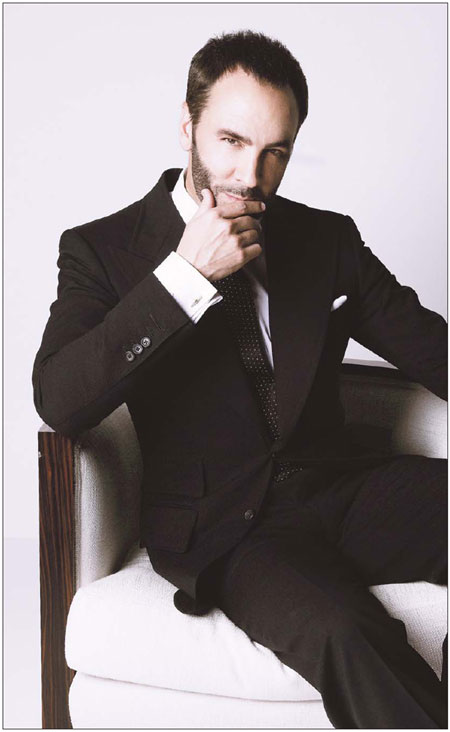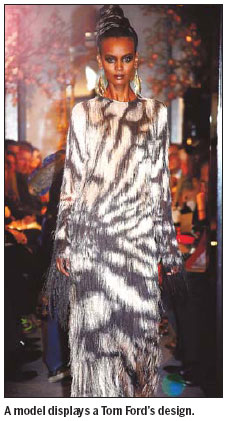More sensual than sexual
By Gan Tian (China Daily)
2011-06-08 19:22
 |
Large Medium Small |
 |
|
Tom Ford expects to highlight his designs' unique qualities to win fans in China. Photos Provided to China Daily |

The designer who turned around Gucci's fortunes and made with a splash with his own brand and sizzling ad campaigns, brings his menswear to China. Gan Tian reports.
When US fashion designer Tom Ford decided to open his first menswear stores in China, he was unsure people here would accept his sizzling sexy advertising campaigns featuring naked bodies, smooth skins and scarlet lips. Commenting on them, Women's Wear Daily says, "the photos range from tame to titillating - the most shocking being the Tom Ford for Men (fragrance) bottle wedged between a woman's glistening thighs, with the bottle barely covering her bare genitalia".
Before Ford took his campaigns to the Middle East market, he had to change them dramatically, as "you can't show any part of a woman except her hands and face".
But he will not be making any change for the China market despite being told the Chinese are rather conservative. Entering his new stores at Hong Kong and Shanghai, is to enter a world of refined, sumptuous masculinity that has become Ford's identity.
"The ad campaigns were more sexual when I was in Gucci. That was a different time, and I was much younger. But now at Tom Ford, my campaigns are more sensual than sexual," the designer says.
"But I don't think sexy means this," he says, unbuttoning his shirt with a flourish.
"Sexiness is in your mind it is touchable and approachable. My customers are very sophisticated. Generally they understand."
Ford, of course, certainly understands sexy. At 49, he cuts a handsome figure in his beard, sparkling blue eyes, without an ounce of extra fat. The four undone buttons of his tight white shirt reveal a taut frame.
He made his name in the fashion industry of 1990s Europe when he was hired by Italian luxury house Gucci as chief designer of its women's ready-to-wear line. That was when Gucci's business was staring at bankruptcy. But Ford's creations pulled it back from the brink.
He rose to the position of creative director two years later, with responsibility for the clothing and perfume line, besides the company's advertising campaigns and store designs.
Within a decade, Ford had turned around the fortunes of Gucci. By 1999, the label was valued at about $4.3 billion, and when he left in 2004, this stood at $10 billion.
His own brand Tom Ford was launched a year after he left Gucci. Although he wanted to come to China as soon as it was launched, an agreement to collaborate with shopping mall Lane Crawford broke down, and he had to put his plans on hold.
"I wish I could have opened a store here faster. The 19th century might have been a French or British century, and the 20th, American, but this century is really about China. Anyone who has a global plan knows immediately that he or she has to be here," Ford says.
Big names like Louis Vuitton, Gucci and Prada rushed into China in the 1990s, and even some small high-end designer labels, such as Marc Jacobs and Diane von Furstenberg, have made it here in the last decade. Ford's fans think he is too late.
"I was starting my company in Europe and my own country 100 or 80 years after Coco Chanel started her company. It's never too late if you have beautiful products," he says, speaking rapidly, his face a picture of confidence.
When he landed in Beijing's airport and saw the Chanel and Gucci advertisements, it suddenly occurred to him that his smaller brand would be pitted against these big names. He realized he would have to highlight his designs' unique qualities to win fans.
"There is only a tiny group of Chinese customers that can afford our clothes," he says.
He stresses that his company will help these people express their individuality. Every season there will be not one look, but a framework within which people can configure things to their liking.
"I like people who are confident. They know what they like. They might buy something they like and mix it with something else," Ford says.
But he regrets he has not found too many people like this in China. Although he reads Vogue China and Marie Claire China, along with fashion magazines from around the world, he has found little inspiration in them.
"I think the fashion stage is still dominated by London and Milan, not even so much by New York. I don't think there are many Chinese designers and celebrities breaking into that world."
A passionate photographer, he plans to photograph five young Chinese socialites for a fashion magazine during his five-day trip to China. "I hope they are inspiring," he says.
When he started his own fashion label, he also launched Fade to Black, a film production company. In 2009, Ford made his directorial debut A Single Man, which earned glowing reviews and collected three Golden Globe nominations. It also won its leading actor, Colin Firth, the best actor award at 2010's Venice film festival.
On his flight to Beijing, he says he read A Day in a Life of Ancient Rome, a new book on Cleopatra, and other novels the names of which he refused to divulge, "I am mulling ideas for a movie and don't want some other film director to poach them," he jokes.
When asked the secret of his success, Ford says the trick is to stay inspired and focused.
His focus was very much in evidence during the interview - he showed impatience with the frequent interruptions for water refills, and shouted to his assistants in the next room, "Guys, I hear you whispering! Sorry I can't concentrate."
"We are living in such an amazing time and I want to live life to its fullest,"he says.
| 分享按鈕 |